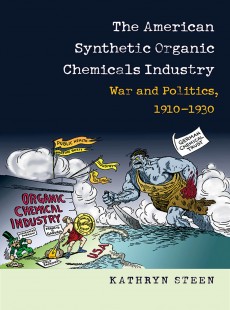
The American Synthetic Organic Chemicals Industry
War and Politics, 1910-1930
Kathryn Steen
 Publisher: University of North Carolina Press
Publisher: University of North Carolina Press
Imprint: The University of North Carolina Press
Published: 08/2014
Pages: 418
Subject: Business and Economics, History
| University of North Carolina
Print ISBN: 9.78E+12
eBook ISBN: 9781469612911
DESCRIPTION
Besides mobilization efforts to make high explosives and war gases, federal policies included protective tariffs, gathering and publishing market information, and, most dramatically, confiscation of German-owned chemical subsidiaries and patents. Meanwhile, firms and universities worked hard to develop scientific and manufacturing expertise. Against a backdrop of hostilities and intrigue, Steen shows how chemicals were deeply entwined with national and international politics and policy during the war and subsequent isolationism of the turbulent early twentieth century.




